#Houses for sale in jamaica kingston
Text

Commercial Property for Sale in Jamaica
If you're looking for Commercial Property for Sale in Jamaica, Remax Elite Jamaica is here to assist. Our team of real estate experts specializes in connecting businesses with the ideal commercial property, whether you want office space, retail space, or industrial facilities. With Remax Elite Jamaica as your trusted partner, you may explore our listings of commercial properties for sale and leverage Jamaica's dynamic business scene.
Types of Properties are available-
Commercial property for sale kingston
Houses for sale in jamaica kingston
Apartments for sale montego bay jamaica
Land for sale in kingston
Mansions for sale jamaica
#Commercial property for sale kingston#Houses for sale in jamaica kingston#remax elite realty#property for sale#jamaica
0 notes
Text
House for Sale in Kingston

Jamaican Real Estate Agents CB Jamaica is the best real estate marketplace in Jamaica, especially for house For Sale In Kingston. At CB Jamaica Realty you can search and find Jamaica homes, villa jamaica, and Development Land at affordable prices. you can follow Coldwell Banker Jamaica's social network sites and get the latest updates on Affordable Houses For Sale In Jamaica by the owner and the rest of the Caribbean.
Services we are Providing-
Property Management
Commercial Rentals
Affordable houses for sale in Jamaica
Property for sale
Real estate investment opportunities
#House for Sale Jamaica#House for Sale In Kingston#Jamaica Property#properties for sale#properties for sale in jamaica
0 notes
Text
House for Rent in Drax Hall St Ann

To meet the needs of housing in different places, Century 21 Jamaica offers a wide range of real estate services. The marketplace offers beautiful House for rent in drax hall st ann that offer cosy and convenient living spaces. These rental options have been chosen to accommodate the specific needs and tastes of those looking for lodging in this picturesque location.Century 21 Jamaica is dedicated to providing successful real estate transactions and assisting clients in finding their dream homes, whether they are looking for a house in Drax Hall, an apartment in Jamaica West Indies, or expert guidance in Kingston's real estate market.
Types of Properties are available-
houses for rent in kingston
land for sale jamaica
condos for sale in jamaica
villas in jamaica for sale
mansions in jamaica
#century 21#century 21 jamaica#real estate agent#property for sale#real estate kingston jamaica#jamaica#realestate
0 notes
Text
Watch "Inside a JMD $8,500,000 House For Sale| Kingston, Jamaica" on YouTube
youtube
0 notes
Text
cars for sale Jamaica

Cars for sale Jamaica
Generally held onto vehicles are sold with no guarantees, so ensure you look at the vehicle however much as could be expected prior to buying it. In the event that conceivable you likewise ought to check the Kelly blue book to get a worth on the held onto vehicles you are considering offering on. Most held onto vehicle deals will permit you a speedy investigation of the vehicle before the exchange has been finished, so it's wise to have somebody with "repairman information" close by. Generally vehicles made available for purchase in government held onto vehicle deals are spotless and all set.
Policing are likewise an incredible asset to track down held onto vehicles available to be purchased, however the Policing vehicle deals are held at various times for the various offices, so timing is vital with these deals. For the most part held onto vehicles can be sold at however much 90% off the proposed retail costs. Some held onto vehicle deals have models that are just a little while old so finding vehicles in superb condition is very conceivable, there are a few extraordinary arrangements whether your purchasing for individual or business use.
House for sale Jamaica
Is it true that you are looking for data on the most proficient method to set up your home available to be purchased? In such a case, you are perfectly positioned. The reason for setting up a house available to be purchased may shift across various families. A need to move to one more city while others need to continue on toward better homes.
To publicize and set up your home available to be purchased in reasonable spots, you might look for the administrations of a total outreach group or essentially a realtor. Such a specialist would feature the one of a kind parts of your home to the forthcoming buyers. You really want to put forth all potential attempts of making your home adequate to sell it quick.
You really want to consider your home to be an item to be showcased and not as your home. The previously mentioned advances would go quite far in helping you to connect the holes between your home and those positive model homes which would bring about the offer of your home at a superior cost.
Jobs in jamaica
There are different Jamaican positions which one can apply for yet if you have any desire to work there you want to acquire a work grant first. This then, at that point, guarantees that those Jamaicans with the vital capabilities are given first thought when a place of work comes accessible.
To get a work license you want to contact the Clergyman of Work in Kingston, Jamaica and it is at his prudence regardless of whether such a grant will be given. If anyway you are an individual from the English Province you can on the off chance that you wish apply for yours upon appearance in Jamaica.
Tragically the individuals who are not named being republic residents should apply for their work licenses before appearance. This will incorporate anybody coming from the USA, India, Africa and the Center East.
Restaurants in jamaica
Jamaica is known for its magnificent foods, which have extensively impacted the universe of global cookery. Jamaican cafés structure a fundamental piece of the feasting choices in the US. They generally center around fish dishes, which are a tremendous treat to all fish sweethearts. As a result of its worldwide ubiquity as a place to get-away, there are numerous lodgings in Jamaica that serve outstanding global feasting delights, notwithstanding brilliantly pre-arranged dishes seasoned with nearby culinary flavors.
Jamaican jerk cooking, which is a course of flavoring and barbecuing meats, poultry and vegetables, is one of the claims to fame of Jamaican culinary achievements. Numerous eateries and inns offer this hot, zesty, and tasty Jamaican dish, which turns into a moment number one with practically all vacationers. Reasonably evaluated, the cafés that offer this specialty are a must-attempt place for those looking for the genuine Caribbean culinary encounters. Highlighting jerk chicken, fish and pork, this diner will in general be packed during the lunch break, particularly on the days when the journey ships come in.
Toyota for sale jamaica
Searching for Toyotas available to be purchased? You have raised a ruckus around town article. On the off chance that you are a vehicle sweetheart and on the off chance that you end up in the situation to purchase a Toyota vehicle, how about you begin giving it some serious idea? With vehicle deal that has started in different urban communities and states across the USA, you can now purchase new, utilized and reconditioned vehicles of your decision with practically no hitch.
As referenced previously, you can find vehicles that are new; those that are reconditioned and imported from nations like UK, Sweden and other European countries; and trade-in vehicles that might have had a place with individuals residing in close areas. In any case, there is one thing normal pretty much this large number of vehicles. Every one of the Toyotas available to be purchased are in astounding circumstances. Regardless of whether there are minor harms and blames, the vehicle vendors would remunerate it in the vehicle cost. I have encountered in any event, this. At the point when I chose to purchase Toyota Yaris, my vehicle vendor was adequately caring to allow me to find out about some shortcoming in its uncommon windows. The remuneration was given by deducting it from the all out cost of the vehicle.
More Information: - https://just876.com/
0 notes
Photo
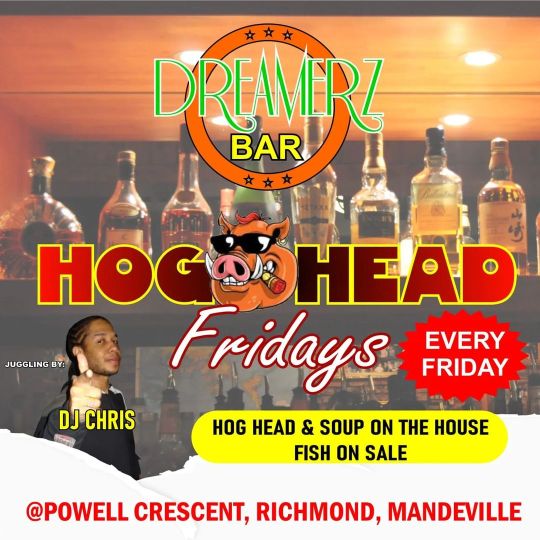
DREAMERZ BAR presents.. Hog Head Fridays!!! TODAY (Friday, June 3, 2022) & Every Friday @ DREAMERZ BAR - Powell Crescent, Richmond, Mandeville, Manchester (JAMAICA). Music By: DJ CHRIS (Zodiac Sound). Hog Head & Soup on the House. Fish on Sale!!!! ・・・ 🎛️🎚️🟩🟩🟩🟩🟩🟩🟩🟨🟨🟥🔊🎶 ・・・ #Bar #Caribbean #Club #Dance #Dancehall #DayRave #Entertainment #Event #Food #Island #Jamaica #Kingston #Lifestyle #Liquor #Lounge #Manchester #Mandeville #MontegoBay #Music #Negril #Nightlife #OchoRios #Party #Rave #Reggae #SaintBess #SaintElizabeth #StBess #StElizabeth #TeamJamaica (at Richmond, Manchester, Jamaica) https://www.instagram.com/p/CeWZHNnOhrN/?igshid=NGJjMDIxMWI=
#bar#caribbean#club#dance#dancehall#dayrave#entertainment#event#food#island#jamaica#kingston#lifestyle#liquor#lounge#manchester#mandeville#montegobay#music#negril#nightlife#ochorios#party#rave#reggae#saintbess#saintelizabeth#stbess#stelizabeth#teamjamaica
0 notes
Photo
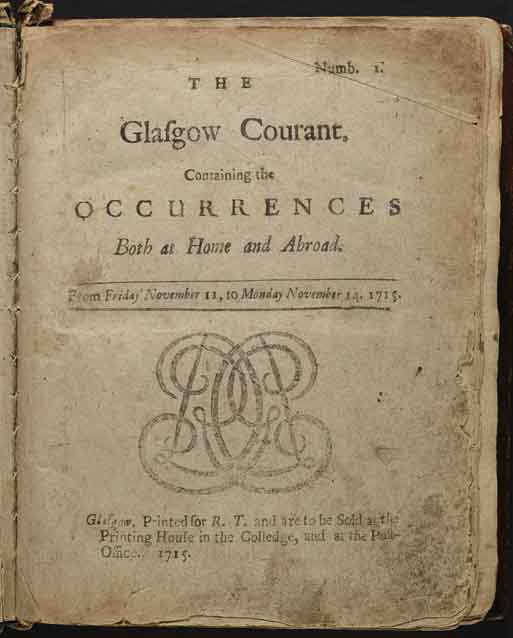
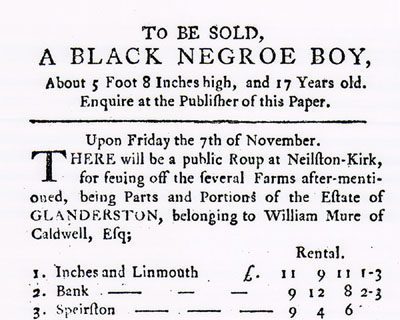
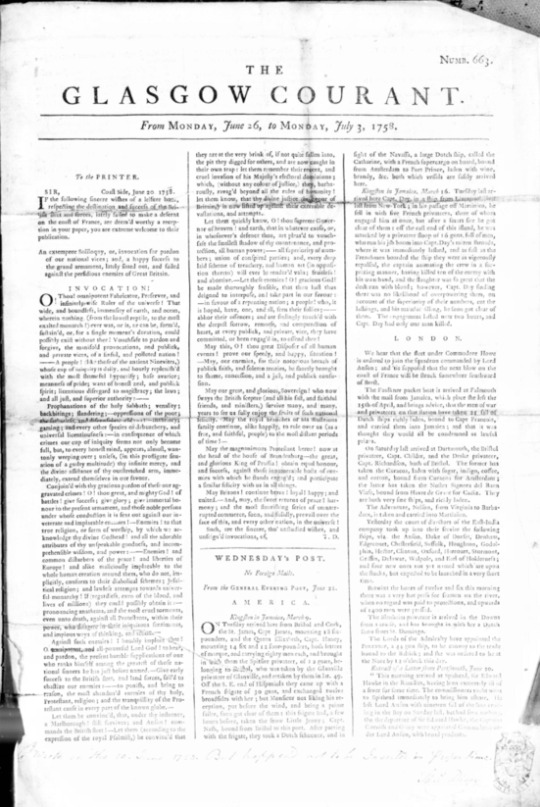
On November 15th 1715 the Glasgow Courant, the city’s first newspaper, appeared for the first time.
Before this the city had been content with “news-letters” written in London, and payments had been made by the Town Council from time to time to the persons who supplied this written intelligence.
The Courant set out to supply a demand for something more regular and comprehensive, the paper was printed by Donald Govan at Glasgow University’s printing house and it was to be issued three times a week. The period, however, was not yet ripe for the venture. Perhaps the necessary experience and equipment were lacking.
At its fourth number the name was changed to West Country Intelligence, and the venture came to an end in May 1716. It had made its bid, nevertheless, and must be taken as a token of development. A second newspaper, The Glasgow Journal, did not appear till 1741.The Glasgow Courant was later resurrected and would later become known as The Advertiser, later in 1805 it would become The Herald, as it is today.
There isn’t really a great deal more about the Courant online, I will however point out the advert which appeared in an edition of the newspaper on 28th August 1758, offering a black slave for sale. and the abhorrent trade in human beings.
For many years Scotland’s historians harboured the illusion that our nation had little to do with the slave trade or plantation slavery. We swept it under the carpet. This was remarkable in the light of Glasgow’s wealth after the act of Union in 1707 with coming from tobacco, sugar, rum and cotton, and Jamaica Streets being found in a number of Scottish towns and cities. For many years, the goods and profits from West Indian slavery were unloaded at Kingston docks in Glasgow.
Occasionally slaves from the Americas were brought back to Scotland to work as servants. Teenage boys who could be employed as pages were particularly fashionable.
Even one of our most celebrated Philosophers David Hume, declared:
“I am apt to suspect the Negroes to be naturally inferior to the Whites. There scarcely ever was a civilised nation of that complexion, nor even any individual, eminent either in action or in speculation. No ingenious manufacture among them, no arts, no sciences.”
The legal status of these slaves in Scotland was unclear however, and in the 1770s the Court of Session ruled that “the purchaser of a negro in the British colonies has no right to the perpetual services of such a negro while in this country”.
It did not become illegal to own a slave in Scotland until 1778.
36 notes
·
View notes
Text
Bob Marley
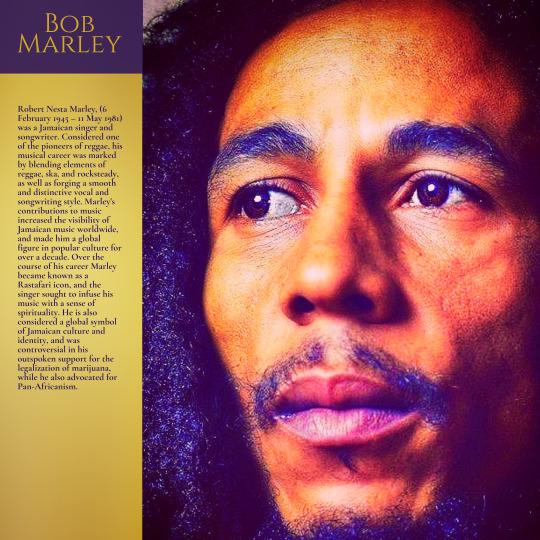
Robert Nesta Marley, (6 February 1945 – 11 May 1981) was a Jamaican singer, songwriter and musician. Considered one of the pioneers of reggae, his musical career was marked by fusing elements of reggae, ska, and rocksteady, as well as his distinctive vocal and songwriting style. Marley's contributions to music increased the visibility of Jamaican music worldwide, and made him a global figure in popular culture for over a decade. Over the course of his career Marley became known as a Rastafari icon, and he infused his music with a sense of spirituality. He is also considered a global symbol of Jamaican music and culture and identity, and was controversial in his outspoken support for the legalization of marijuana, while he also advocated for Pan-Africanism.
Born in Nine Mile, British Jamaica, Marley began his professional musical career in 1963, after forming Bob Marley and the Wailers. The group released its debut studio album The Wailing Wailers in 1965, which contained the single "One Love/People Get Ready"; the song was popular worldwide, and established the group as a rising figure in reggae. The Wailers subsequently released eleven further studio albums; while initially employing louder instrumentation and singing, the group began engaging in rhythmic-based song construction in the late 1960s and early 1970s, which coincided with the singer's conversion to Rastafarianism. During this period Marley relocated to London, and the group typified their musical shift with the release of the album The Best of The Wailers (1971).
The group attained international success after the release of the albums Catch a Fire and Burnin' (both 1973), and forged a reputation as touring artists. Following the disbandment of the Wailers a year later, Marley went on to release his solo material under the band's name. His debut studio album Natty Dread (1974) received positive reception, as did its follow-up Rastaman Vibration (1976). A few months after the album's release Marley survived an assassination attempt at his home in Jamaica, which prompted him to permanently relocate to London. During his time in London he recorded the album Exodus (1977); it incorporated elements of blues, soul, and British rock, enjoyed widespread commercial and critical success.
In 1977, Marley was diagnosed with acral lentiginous melanoma; he died as a result of the illness in 1981. His fans around the world expressed their grief, and he received a state funeral in Jamaica. The greatest hits album Legend was released in 1984, and became the best-selling reggae album of all time. Marley also ranks as one of the best-selling music artists of all time, with estimated sales of more than 75 million records worldwide. He was posthumously honored by Jamaica soon after his death with a designated Order of Merit by his nation. In 1994, he was inducted into the Rock and Roll Hall of Fame. Rolling Stone ranked him No. 11 on its list of the 100 Greatest Artists of All Time.
Early life and career
Bob Marley was born on 6 February 1945 at the farm of his maternal grandfather in Nine Mile, Saint Ann Parish, Jamaica, to Norval Sinclair Marley and Cedella Malcolm. Norval Marley was a white Jamaican originally from Sussex, whose family claimed to have Syrian Jewish origins. Norval claimed to have been a captain in the Royal Marines; at the time of his marriage to Cedella Malcolm, an Afro-Jamaican then 18 years old, he was employed as a plantation overseer. Bob Marley's full name is Robert Nesta Marley, though some sources give his birth name as Nesta Robert Marley, with a story that when Marley was still a boy a Jamaican passport official reversed his first and middle names because Nesta sounded like a girl's name. Norval provided financial support for his wife and child but seldom saw them as he was often away. Bob Marley attended Stepney Primary and Junior High School which serves the catchment area of Saint Ann. In 1955, when Bob Marley was 10 years old, his father died of a heart attack at the age of 70. Marley's mother went on later to marry Edward Booker, a civil servant from the United States, giving Marley two half-brothers: Richard and Anthony.
Bob Marley and Neville Livingston (later known as Bunny Wailer) had been childhood friends in Nine Mile. They had started to play music together while at Stepney Primary and Junior High School. Marley left Nine Mile with his mother when he was 12 and moved to Trenchtown, Kingston. She and Thadeus Livingston (Bunny Wailer's father) had a daughter together whom they named Claudette Pearl, who was a younger sister to both Bob and Bunny. Now that Marley and Livingston were living together in the same house in Trenchtown, their musical explorations deepened to include the latest R&B from United States radio stations whose broadcasts reached Jamaica, and the new ska music. The move to Trenchtown was proving to be fortuitous, and Marley soon found himself in a vocal group with Bunny Wailer, Peter Tosh, Beverley Kelso and Junior Braithwaite. Joe Higgs, who was part of the successful vocal act Higgs and Wilson, resided on 3rd St., and his singing partner Roy Wilson had been raised by the grandmother of Junior Braithwaite. Higgs and Wilson would rehearse at the back of the houses between 2nd and 3rd Streets, and soon, Marley (now residing on 2nd St.), Junior Braithwaite and the others were congregating around this successful duo. Marley and the others did not play any instruments at this time, and were more interested in being a vocal harmony group. Higgs was glad to help them develop their vocal harmonies, although more importantly, he had started to teach Marley how to play guitar—thereby creating the bedrock that would later allow Marley to construct some of the biggest-selling reggae songs in the history of the genre.
Musical career
1962–72: Early years
In February 1962, Marley recorded four songs, "Judge Not", "One Cup of Coffee", "Do You Still Love Me?" and "Terror", at Federal Studios for local music producer Leslie Kong. Three of the songs were released on Beverley's with "One Cup of Coffee" being released under the pseudonym Bobby Martell.
In 1963, Bob Marley, Bunny Wailer, Peter Tosh, Junior Braithwaite, Beverley Kelso, and Cherry Smith were called the Teenagers. They later changed the name to the Wailing Rudeboys, then to the Wailing Wailers, at which point they were discovered by record producer Coxsone Dodd, and finally to the Wailers. Their single "Simmer Down" for the Coxsone label became a Jamaican No. 1 in February 1964 selling an estimated 70,000 copies. The Wailers, now regularly recording for Studio One, found themselves working with established Jamaican musicians such as Ernest Ranglin (arranger "It Hurts To Be Alone"), the keyboardist Jackie Mittoo and saxophonist Roland Alphonso. By 1966, Braithwaite, Kelso, and Smith had left the Wailers, leaving the core trio of Bob Marley, Bunny Wailer, and Peter Tosh.
In 1966, Marley married Rita Anderson, and moved near his mother's residence in Wilmington, Delaware in the United States for a short time, during which he worked as a DuPont lab assistant and on the assembly line at a Chrysler plant in nearby Newark, under the alias Donald Marley.
Though raised as a Catholic, Marley became interested in Rastafari beliefs in the 1960s, when away from his mother's influence. After returning to Jamaica, Marley formally converted to Rastafari and began to grow dreadlocks.
After a financial disagreement with Dodd, Marley and his band teamed up with Lee "Scratch" Perry and his studio band, the Upsetters. Although the alliance lasted less than a year, they recorded what many consider the Wailers' finest work. Marley and Perry split after a dispute regarding the assignment of recording rights, but they would continue to work together.
1969 brought another change to Jamaican popular music in which the beat slowed down even further. The new beat was a slow, steady, ticking rhythm that was first heard on The Maytals song "Do the Reggay." Marley approached producer Leslie Kong, who was regarded as one of the major developers of the reggae sound. For the recordings, Kong combined the Wailers with his studio musicians called Beverley's All-Stars, which consisted of the bassists Lloyd Parks and Jackie Jackson, the drummer Paul Douglas, the keyboard players Gladstone Anderson and Winston Wright, and the guitarists Rad Bryan, Lynn Taitt, and Hux Brown. As David Moskowitz writes, "The tracks recorded in this session illustrated the Wailers' earliest efforts in the new reggae style. Gone are the ska trumpets and saxophones of the earlier songs, with instrumental breaks now being played by the electric guitar." The songs recorded would be released as the album The Best of The Wailers, including tracks "Soul Shakedown Party," "Stop That Train," "Caution," "Go Tell It on the Mountain," "Soon Come," "Can't You See," "Soul Captives," "Cheer Up," "Back Out," and "Do It Twice".
Between 1968 and 1972, Bob and Rita Marley, Peter Tosh and Bunny Wailer re-cut some old tracks with JAD Records in Kingston and London in an attempt to commercialise the Wailers' sound. Bunny later asserted that these songs "should never be released on an album ... they were just demos for record companies to listen to". In 1968, Bob and Rita visited songwriter Jimmy Norman at his apartment in the Bronx. Norman had written the extended lyrics for Kai Winding's "Time Is on My Side" (covered by the Rolling Stones) and had also written for Johnny Nash and Jimi Hendrix. A three-day jam session with Norman and others, including Norman's co-writer Al Pyfrom, resulted in a 24-minute tape of Marley performing several of his own and Norman-Pyfrom's compositions. This tape is, according to Reggae archivist Roger Steffens, rare in that it was influenced by pop rather than reggae, as part of an effort to break Marley into the US charts. According to an article in The New York Times, Marley experimented on the tape with different sounds, adopting a doo-wop style on "Stay With Me" and "the slow love song style of 1960s artists" on "Splish for My Splash". An artist yet to establish himself outside his native Jamaica, Marley lived in Ridgmount Gardens, Bloomsbury, during 1972.
1972–74: Move to Island Records
In 1972, Bob Marley signed with CBS Records in London and embarked on a UK tour with soul singer Johnny Nash. While in London the Wailers asked their road manager Brent Clarke to introduce them to Chris Blackwell, who had licensed some of their Coxsone releases for his Island Records. The Wailers intended to discuss the royalties associated with these releases; instead, the meeting resulted in the offer of an advance of £4,000 to record an album. Since Jimmy Cliff, Island's top reggae star, had recently left the label, Blackwell was primed for a replacement. In Marley, Blackwell recognised the elements needed to snare the rock audience: "I was dealing with rock music, which was really rebel music. I felt that would really be the way to break Jamaican music. But you needed someone who could be that image. When Bob walked in he really was that image." The Wailers returned to Jamaica to record at Harry J's in Kingston, which resulted in the album Catch a Fire.
Primarily recorded on an eight-track, Catch a Fire marked the first time a reggae band had access to a state-of-the-art studio and were accorded the same care as their rock 'n' roll peers. Blackwell desired to create "more of a drifting, hypnotic-type feel than a reggae rhythm", and restructured Marley's mixes and arrangements. Marley travelled to London to supervise Blackwell's overdubbing of the album which included tempering the mix from the bass-heavy sound of Jamaican music and omitting two tracks.
The Wailers' first album for Island, Catch a Fire, was released worldwide in April 1973, packaged like a rock record with a unique Zippo lighter lift-top. Initially selling 14,000 units, it received a positive critical reception. It was followed later that year by the album Burnin' which included the song "I Shot the Sheriff". Eric Clapton was given the album by his guitarist George Terry in the hope that he would enjoy it. Clapton was impressed and chose to record a cover version of "I Shot the Sheriff" which became his first US hit since "Layla" two years earlier and reached number 1 on the Billboard Hot 100 on 14 September 1974. Many Jamaicans were not keen on the new reggae sound on Catch a Fire, but the Trenchtown style of Burnin found fans across both reggae and rock audiences.
During this period, Blackwell gifted his Kingston residence and company headquarters at 56 Hope Road (then known as Island House) to Marley. Housing Tuff Gong Studios, the property became not only Marley's office but also his home.
The Wailers were scheduled to open 17 shows in the US for Sly and the Family Stone. After four shows, the band was fired because they were more popular than the acts they were opening for. The Wailers disbanded in 1974, with each of the three main members pursuing a solo career.
1974–76: Line-up changes and shooting
Despite the break-up, Marley continued recording as "Bob Marley & The Wailers". His new backing band included brothers Carlton and Aston "Family Man" Barrett on drums and bass respectively, Junior Marvin and Al Anderson on lead guitar, Tyrone Downie and Earl "Wya" Lindo on keyboards, and Alvin "Seeco" Patterson on percussion. The "I Threes", consisting of Judy Mowatt, Marcia Griffiths, and Marley's wife, Rita, provided backing vocals. In 1975, Marley had his international breakthrough with his first hit outside Jamaica, with a live version of "No Woman, No Cry", from the Live! album. This was followed by his breakthrough album in the United States, Rastaman Vibration (1976), which reached the Top 50 of the Billboard Soul Charts.
On 3 December 1976, two days before "Smile Jamaica", a free concert organised by the Jamaican Prime Minister Michael Manley in an attempt to ease tension between two warring political groups, Marley, his wife, and manager Don Taylor were wounded in an assault by unknown gunmen inside Marley's home. Taylor and Marley's wife sustained serious injuries but later made full recoveries. Bob Marley received minor wounds in the chest and arm. The attempt on his life was thought to have been politically motivated, as many felt the concert was really a support rally for Manley. Nonetheless, the concert proceeded, and an injured Marley performed as scheduled, two days after the attempt. When asked why, Marley responded, "The people who are trying to make this world worse aren't taking a day off. How can I?" The members of the group Zap Pow played as Bob Marley's backup band before a festival crowd of 80,000 while members of The Wailers were still missing or in hiding.
1976–79: Relocation to England
Marley left Jamaica at the end of 1976, and after a month-long "recovery and writing" sojourn at the site of Chris Blackwell's Compass Point Studios in Nassau, Bahamas, arrived in England, where he spent two years in self-imposed exile.
Whilst in England, he recorded the albums Exodus and Kaya. Exodus stayed on the British album charts for 56 consecutive weeks. It included four UK hit singles: "Exodus", "Waiting in Vain", "Jamming", and "One Love" (a rendition of Curtis Mayfield's hit, "People Get Ready"). During his time in London, he was arrested and received a conviction for possession of a small quantity of cannabis. In 1978, Marley returned to Jamaica and performed at another political concert, the One Love Peace Concert, again in an effort to calm warring parties. Near the end of the performance, by Marley's request, Michael Manley (leader of then-ruling People's National Party) and his political rival Edward Seaga (leader of the opposing Jamaica Labour Party) joined each other on stage and shook hands.
Under the name Bob Marley and the Wailers 11 albums were released, four live albums and seven studio albums. The releases included Babylon by Bus, a double live album with 13 tracks, were released in 1978 and received critical acclaim. This album, and specifically the final track "Jamming" with the audience in a frenzy captured the intensity of Marley's live performances.
1979–81: Later years
Survival, a defiant and politically charged album, was released in 1979. Tracks such as "Zimbabwe", "Africa Unite", "Wake Up and Live", and "Survival" reflected Marley's support for the struggles of Africans. His appearance at the Amandla Festival in Boston in July 1979 showed his strong opposition to South African apartheid, which he already had shown in his song "War" in 1976. In early 1980, he was invited to perform at 17 April celebration of Zimbabwe's Independence Day.
Uprising (1980) was Bob Marley's final studio album, and is one of his most religious productions; it includes "Redemption Song" and "Forever Loving Jah". Confrontation, released posthumously in 1983, contained unreleased material recorded during Marley's lifetime, including the hit "Buffalo Soldier" and new mixes of singles previously only available in Jamaica.
Illness and death
In July 1977, Marley was found to have a type of malignant melanoma under the nail of a toe. Contrary to urban legend, this lesion was not primarily caused by an injury during a football match that year but was instead a symptom of already-existing cancer. Marley turned down his doctors' advice to have his toe amputated (which would have hindered his performing career), citing his religious beliefs, and instead, the nail and nail bed were removed and a skin graft was taken from his thigh to cover the area. Despite his illness, he continued touring and was in the process of scheduling a world tour in 1980.
The album Uprising was released in May 1980. The band completed a major tour of Europe, where it played its biggest concert to 100,000 people in Milan. After the tour, Marley went to the United States, where he performed two shows at Madison Square Garden in New York City as part of the Uprising Tour.
Marley's last concert occurred at the Stanley Theater (now called The Benedum Center For The Performing Arts) in Pittsburgh, Pennsylvania, on 23 September 1980. Just two days earlier he had collapsed during a jogging tour in Central Park and was brought to the hospital where he learned that his cancer had spread to his brain.
The only known photographs from the show were featured in Kevin Macdonald's documentary film Marley.
Shortly afterward, Marley's health deteriorated as his cancer had spread throughout his body. The rest of the tour was canceled and Marley sought treatment at the Bavarian clinic of Josef Issels, where he received an alternative cancer treatment called Issels treatment partly based on avoidance of certain foods, drinks, and other substances. After eight months of effectively failing to treat his advancing cancer Marley boarded a plane for his home in Jamaica.
While Marley was flying home from Germany to Jamaica, his vital functions worsened. After landing in Miami, Florida, he was taken to the hospital for immediate medical attention. Marley died on 11 May 1981 at Cedars of Lebanon Hospital in Miami (now University of Miami Hospital), aged 36. The spread of melanoma to his lungs and brain caused his death. His final words to his son Ziggy were "Money can't buy life."
Marley received a state funeral in Jamaica on 21 May 1981, which combined elements of Ethiopian Orthodoxy and Rastafari tradition. He was buried in a chapel near his birthplace with his guitar.
On 21 May 1981, Jamaican Prime Minister Edward Seaga delivered the final funeral eulogy to Marley, declaring:
His voice was an omnipresent cry in our electronic world. His sharp features, majestic looks, and prancing style a vivid etching on the landscape of our minds. Bob Marley was never seen. He was an experience which left an indelible imprint with each encounter. Such a man cannot be erased from the mind. He is part of the collective consciousness of the nation.
Legacy
Awards and honours
1976: Rolling Stone Band of the Year
June 1978: Awarded the Peace Medal of the Third World from the United Nations.
February 1981: Awarded the Jamaican Order of Merit, then the nation's third highest honour, .
March 1994: Inducted into the Rock and Roll Hall of Fame.
1999: Album of the Century for Exodus by Time Magazine.
February 2001: A star on the Hollywood Walk of Fame.
February 2001: Awarded Grammy Lifetime Achievement Award.
2004: Rolling Stone ranked him No. 11 on their list of the 100 Greatest Artists of All Time.
2004: Among the first inductees into the UK Music Hall of Fame
"One Love" named song of the millennium by BBC.
Voted as one of the greatest lyricists of all time by a BBC poll.
2006: A blue plaque was unveiled at his first UK residence in Ridgmount Gardens, London, dedicated to him by the Nubian Jak Community Trust and supported by Her Majesty's Foreign Office.
2010: Catch a Fire inducted into the Grammy Hall of Fame (Reggae Album).
Other tributes
A statue was inaugurated, next to the national stadium on Arthur Wint Drive in Kingston to commemorate him. In 2006, the New York City Department of Education co-named a portion of Church Avenue from Remsen Avenue to East 98th Street in the East Flatbush section of Brooklyn as "Bob Marley Boulevard". In 2008, a statue of Marley was inaugurated in Banatski Sokolac, Serbia.
Internationally, Marley's message also continues to reverberate among various indigenous communities. For instance, the Australian Aboriginal people continue to burn a sacred flame to honour his memory in Sydney's Victoria Park, while members of the Native American Hopi and Havasupai tribes revere his work. There are also many tributes to Bob Marley throughout India, including restaurants, hotels, and cultural festivals.
Marley evolved into a global symbol, which has been endlessly merchandised through a variety of mediums. In light of this, author Dave Thompson in his book Reggae and Caribbean Music, laments what he perceives to be the commercialised pacification of Marley's more militant edge, stating:
Bob Marley ranks among both the most popular and the most misunderstood figures in modern culture ... That the machine has utterly emasculated Marley is beyond doubt. Gone from the public record is the ghetto kid who dreamed of Che Guevara and the Black Panthers, and pinned their posters up in the Wailers Soul Shack record store; who believed in freedom; and the fighting which it necessitated, and dressed the part on an early album sleeve; whose heroes were James Brown and Muhammad Ali; whose God was Ras Tafari and whose sacrament was marijuana. Instead, the Bob Marley who surveys his kingdom today is smiling benevolence, a shining sun, a waving palm tree, and a string of hits which tumble out of polite radio like candy from a gumball machine. Of course it has assured his immortality. But it has also demeaned him beyond recognition. Bob Marley was worth far more.
Several film adaptations have evolved as well. For instance, a feature-length documentary about his life, Rebel Music, won various awards at the Grammys. With contributions from Rita, The Wailers, and Marley's lovers and children, it also tells much of the story in his own words. In February 2008, director Martin Scorsese announced his intention to produce a documentary movie on Marley. The film was set to be released on 6 February 2010, on what would have been Marley's 65th birthday. However, Scorsese dropped out due to scheduling problems. He was replaced by Jonathan Demme, who dropped out due to creative differences with producer Steve Bing during the beginning of editing. Kevin Macdonald replaced Demme and the film, Marley, was released on 20 April 2012. In 2011, ex-girlfriend and filmmaker Esther Anderson, along with Gian Godoy, made the documentary Bob Marley: The Making of a Legend, which premiered at the Edinburgh International Film Festival.
In October 2015, Jamaican author Marlon James' novel A Brief History of Seven Killings, a fictional account of the attempted assassination of Marley, won the 2015 Man Booker Prize at a ceremony in London.
In February 2020, the musical Get Up Stand Up!, the Bob Marley Story was announced by writer Lee Hall and director Dominic Cooke, starring Arinzé Kene as Bob Marley. It will open at London's Lyric Theatre in February 2021.
Personal life
Religion
Bob Marley was a member for some years of the Rastafari movement, whose culture was a key element in the development of reggae. He became an ardent proponent of Rastafari, taking its music out of the socially deprived areas of Jamaica and onto the international music scene. He once gave the following response, which was typical, to a question put to him during a recorded interview:
Interviewer: "Can you tell the people what it means being a Rastafarian?"
Marley: "I would say to the people, Be still, and know that His Imperial Majesty, Emperor Haile Selassie of Ethiopia is the Almighty. Now, the Bible seh so, Babylon newspaper seh so, and I and I the children seh so. Yunno? So I don't see how much more reveal our people want. Wha' dem want? a white god, well God come black. True true."
Archbishop Abuna Yesehaq baptised Marley into the Ethiopian Orthodox Church, giving him the name Berhane Selassie, on 4 November 1980, shortly before his death.
Family
Bob Marley married Alpharita Constantia "Rita" Anderson in Kingston, Jamaica, on 10 February 1966. Marley had many children: four with his wife Rita, two adopted from Rita's previous relationships, and several others with different women. The official Bob Marley website acknowledges 11 children.
Those listed on the official site are:
Sharon, born 23 November 1964, daughter of Rita from a previous relationship but then adopted by Marley after his marriage with Rita
Cedella born 23 August 1967, to Rita
David "Ziggy", born 17 October 1968, to Rita
Stephen, born 20 April 1972, to Rita
Robert "Robbie", born 16 May 1972, to Pat Williams
Rohan, born 19 May 1972, to Janet Hunt
Karen, born 1973 to Janet Bowen
Stephanie, born 17 August 1974; according to Cedella Booker she was the daughter of Rita and a man called Ital with whom Rita had an affair, nonetheless, she was acknowledged as Bob's daughter
Julian, born 4 June 1975, to Lucy Pounder
Ky-Mani, born 26 February 1976, to Anita Belnavis
Damian, born 21 July 1978, to Cindy Breakspeare
Other sites have noted additional individuals who claim to be family members, as noted below:
Makeda was born on 30 May 1981, to Yvette Crichton, after Marley's death. Meredith Dixon's book lists her as Marley's child, but she is not listed as such on the Bob Marley official website.
Various websites, for example, also list Imani Carole, born 22 May 1963 to Cheryl Murray; but she does not appear on the official Bob Marley website.
Marley also has two notable grandsons, musician Skip Marley and American football player Nico Marley.
Association football
Aside from music, association football played a major role throughout his life. As well as playing the game, in parking lots, fields, and even inside recording studios, growing up he followed the Brazilian club Santos and its star player Pelé. Marley surrounded himself with people from the sport, and in the 1970s made the Jamaican international footballer Allan "Skill" Cole his tour manager. He told a journalist, "If you want to get to know me, you will have to play football against me and the Wailers."
Personal viewsPan-Africanism
Marley was a Pan-Africanist and believed in the unity of African people worldwide. His beliefs were rooted in his Rastafari religious beliefs. He was substantially inspired by Marcus Garvey, and had anti-imperialist and pan-Africanist themes in many of his songs, such as "Zimbabwe", "Exodus", "Survival", "Blackman Redemption", and "Redemption Song". "Redemption Song" draws influence from a speech given by Marcus Garvey in Nova Scotia, 1937. Marley held that independence of African countries from European domination was a victory for all those in the African diaspora. In the song "Africa Unite", he sings of a desire for all peoples of the African diaspora to come together and fight against "Babylon"; similarly, in the song "Zimbabwe", he marks the liberation of the whole continent of Africa, and evokes calls for unity between all Africans, both within and outside Africa.
Cannabis
Marley considered cannabis a healing herb, a "sacrament", and an "aid to medication"; he supported the legalisation of the drug. He thought that marijuana use was prevalent in the Bible, reading passages such as Psalms 104:14 as showing approval of its usage. Marley began to use cannabis when he converted to the Rastafari faith from Catholicism in 1966. He was arrested in 1968 after being caught with cannabis but continued to use marijuana in accordance with his religious beliefs. Of his marijuana usage, he said, "When you smoke herb, herb reveal yourself to you. All the wickedness you do, the herb reveal itself to yourself, your conscience, show up yourself clear, because herb make you meditate. Is only a natural t'ing and it grow like a tree." Marley saw marijuana usage as a vital factor in religious growth and connection with Jah, and as a way to philosophise and become wiser.
Discography
Studio albums
The Wailing Wailers (1965)
Soul Rebels (1970)
Soul Revolution (1971)
The Best of The Wailers (1971)
Catch a Fire (1973)
Burnin' (1973)
Natty Dread (1974)
Rastaman Vibration (1976)
Exodus (1977)
Kaya (1978)
Survival (1979)
Uprising (1980)
Confrontation (1983)
Live albums
Live! (1975)
Babylon by Bus (1978)
See also
Outline of Bob Marley
List of peace activists
Fabian Marley
Desis bobmarleyi – an underwater spider species named in honor of Marley
8 notes
·
View notes
Text
youtube
youtube
youtube
youtube
Reggae Britannia
(BBC Four, 2/11/11)
385 Willesden High Road is tucked away behind a row of dilapidated 19th century houses, its entrance obscured by high locked gates and a walled yard. But 385 is a treasure trove of reggae history. It's called Theorem, Music Village, and it's where we're recording several artist interviews for Reggae Britannia. As we arrive, there's a band in the studio rehearsing a romantic Lovers Rock number, there's a man up a rickety ladder painting the walls and another mopping up from an all night dance in the 'functions room' with its damp lino and garish red felt walls.
T-Jae, the tall soft-spoken proprietor of what was once called BBMC (the Brent Black Music Cooperative) helps us with our camera gear. He's got coffee brewing in the kitchen beside an open can of condensed milk. Before T-Jae's time this was a leisure centre filled with rattle of pinball machines and the click of snooker balls - now replaced by the drum 'n bass of reggae rhythms leaking from the studio.
We're here to interview Dave Barker, one half of the Dave and Ansell Collins vocal duo who set the teenage mods alight, back in 1971, performing a novelty number called 'Double Barrel'. Dave's a quietly spoken man with a hint of a stammer. He tells us how, when he first came to this country (and he stayed here ever after) he peered out through the window of his BOAC plane as it banked over the smoking chimneys of the snow-covered houses below and wondered 'how come they have so many bakeries in England?' On the drive from the airport he was shocked at seeing white men digging the road and taking out garbage: 'Wow man, that was strange, you didn't see those things in Jamaica'. Nor dogs wearing winter vests, nor steak and kidney pies, nor that little sparrow he spied pecking the top off a milk bottle. He can't help himself: Dave sings a refrain from Matt Munro's 'Born Free' and segues into 'Summer Holiday'.
Dave arrived in the U.K exactly ten years before Theorem opened its doors to top British and Jamaican reggae artists passing through. Today, there's the legendary Max Romeo sitting on bench in the winter sunshine, his grey locks neatly tucked into a woolly beret. In 1969, Max brought his wicked song 'Wet Dream' to Britain and its risqué lyrics - which got it banned in clubs and on the BBC - made it an anthem for skinheads in dance halls all across Britain. He sings a few lines, diffidently explaining how it caused an 'upstir' among the rebellious youth of the time. He's a little ashamed of it now because, by the mid 70s, Max had embraced the wisdom of Rastafari. That was when he wrote and recorded some of reggae's most powerful and memorable music in the Black Ark studio of Lee Scratch Perry: 'War In A Babylon' and 'Chase The Devil'. When those songs arrived here, first as pre-releases and then remixed by Island Records, they inspired our fledgling roots reggae bands and then the punks and then Bob Marley too. Max intones a few lines from 'Chase The Devil', an ironic, cautionary tale that has been covered or sampled by dozens of musicians - including Jay-Z in 'The Black Album' - and was featured in the video-game Grand Theft Auto.
'I'm gonna put on an iron shirt and chase Satan out of earth' he sings. 'I'm gonna send him to outer space to find another race'. Max explains: 'The devil is the negative within the psyche. Chasing the devil means chasing the negative out of your mind.' There are people wandering in and out while he speaks; musicians carrying drums and guitars into this studio that's cold as a morgue, or dropping off an amp or a heavyweight speaker, or they've come to pay their respects to the master, with a hug or a high-five.
T-Jae comes sauntering by with a piece of carpet under his arm to help our sound recordist dampen the 'live' acoustic of the room (yes, we still have a sound recordist on our crew) and he tells me that among the band members in the studio today is none other than Bigga Morrison. Bigga's not a front man like Max, but a keyboard virtuoso and music director of renown. Reggae royalty. The band take a another break for a smoke in the yard and Bigga, immaculate in pin-striped suit and brogues, describes growing up in this country as a second generation West Indian:
'My parents had experienced troubles and threats on the streets, back in the '50s, with the Teddy Boys and such, but they wouldn't discuss those things because they wanted to keep you free from the pressures. But as we grew up, we took our message and our fight onto the streets with the roots and culture music we played in bands like Steel Pulse and Aswad.'
Later during the interview, I asked Bigga to show us how the British reggae producers, back in the early 1970s, added violins to the Jamaican imports to make them sound 'more classical'. Unfortunately, he's lost his glasses and so can't read the score. Tee Jay's on hand to send for a replacement pair. Bigga fills in time by playing us a delightful new track by his band the Skatronics, but when the glasses arrive, they're all wrong for Bigga. He wears them anyway, and peers astigmatically at the music for 'Young Gifted And Black' which is layered in symphonic-style strings. Bigga (educated at Trinity College of Music) explains how Jamaican reggae gradually transformed into a British musical experience, first through the dub sounds and conscious lyrics of hardworking roots groups like Aswad and then by the bands that went platinum: the 2 Tone crowd, UB40 and The Police.
Bigga's being called back to rehearsals now, so we break for a late lunch. It's a choice of The New Golden Duck Chinese Take Away or the Caribbean place half a mile up the road. We do the walk and settle for salt fish and akee. Or rather, the others do. I choose the goat curry on plantains and soon regret it.
Back in Theorem, Bigga's at the keyboards and a couple of pretty female vocalists are delivering more saccharine Lovers Rock. And that's where we see Big Youth, in among them, gyrating his hips to the pounding bass and chugging upbeat of the guitar. He's chaperoned by a petite Italian lady from an artists' agency called Roots Rockers. She's Trish, and she's exhausted because they've only just returned from a nightmare flight from Spain. Trish is a miracle of calm and efficiency in the maelstrom of the struggling reggae business and it's clear all the artists adore her. Trish has offered us the opportunity to interview Big Youth, the toaster who excited British reggae fans with his revolutionary, rasta-inspired lyrics in the mid '70s. He's on top form today, his wiry body twisting and swaying in the interview chair as he sings lines from 'Hit The Road Jack', telling me how the great Ray Charles called him up one Christmas-time to admit that Big Youth's version was just 'the best'. 'Big Youth stole the scene,' he concludes. Modesty isn't one of Big Youth's virtues. But I can vouch for his status, and integrity. I first met him inside Randy's Record shop in Kingston Jamaica back in '77. He was checking out the sales of his album - visiting these record stores was about the only way an artist could tell how many were selling. He was as big a name as Marley at the time, and revered both on the island and over here. We met again - by chance - in Lagos, Nigeria, when he was on the run from some unscrupulous promoter. He's older and greyer now, but with no loss of energy, showmanship or sharp humour. And the red, gold and green implants in his front teeth are still there.
The filming days at Theorem haven't only been productive for our ninety minute programme, they've also been enormous fun. Maybe it's the familiarity and affection the artists have for this building, or maybe it's what they call 'the spirits' of the house: a combination of all those sounds and experiences imbedded in the cracking plaster walls, the creaky floorboards which once the feet of hallowed artists trod, or the reverberating bass you can hear down Theorem's honeycomb of corridors.
We'll be back here later in the week to interview the fiery, bubbly Lovers Rock singer Sylvia Tella, from Manchester; and Tippa Irie who came to fame DJing for the Saxon sound system, and maybe Dennis Bovell, the multi-talented producer/song writer and bass player, who did so much to anglicise reggae music in this country. Oh, and Trish says Dennis Alcapone's coming by, the dapper, bowler-hatted vocalist who brought a whole new style of toasting to these shores with songs like 'Guns Don't Argue': 'Don't call me Scarface, my name is Capone, C-A-P-O-N-E!'
For him, we'll haul our equipment boxes down the dark corridors of Theorem (we never could find the light switches, thriftily hidden away in recesses above door frames). Because we'll place him in a room, behind the studio, which is every reggae fan's dream, an Aladdin's cave of antique tape machines and mixers, and an expansive crimson casting couch. The wood-trim Rainderk desk dates from the early '70s when Reggae first exploded onto our pop charts with songs like 'Young Gifted And Black', bringing an upbeat musical thrill not just to those of Caribbean origin and the packs of skinheads who followed them around the country, but to the whole nation. This mixing desk was donated by Pete Townshend of The Who. It has made history since, recording reggae artists like The Wailers, Gregory Isaacs, Aswad, Janet Kay, Maxi Priest ... and so many more.
The traffic's slow on Willesden High Road as we leave the studios and T- Jae waves us into the evening gridlock and shuts the gates. Back-in-the-day, Theorem would be filling up with dreadlocked musicians and their natty entourage, ready for another all night session. Sometimes it still does, but with the proliferation of cheap home studios and a music industry in crisis, it's a whole lot quieter now. No sessions tonight. Just the rattling pipes, the whispering corridors, the vacant studio and the ghosts of British reggae history.
#2011#reggae britannia#bbc four#bbc#bbc news#reggae#roots reggae#video#youtube#black music#music#west indians#caribbean#black british#documentary#documentaries
2 notes
·
View notes
Text
Looking for the property for sale in Jamaica? You can find a perfect match with the aid of our experienced real estate agent. We have a variety of solutions to fit your needs, ranging from houses for sale in Jamaica Kingston to flats in Kingston for rent. Discover your next house or possible investment by looking through our listings. Don't pass up the opportunity to purchase a plot of land in Jamaica. Contact now!
#property for sale in Jamaica#jamaica#houses for sale in jamaica kingston#houses for sale in jamaica#commercial building for sale in jamaica#commercial property for sale in montego bay jamaica#commercial space for rent kingston jamaica#real estate network#real estate agent jamaica
1 note
·
View note
Text
House For Rent In Montego Bay
CB Jamaica has all the properties in the industry of real estate Jamaica, we bring to you the listings on properties for sale as well as properties for rent in Jamaica. There are many house for rent in Montego Bay which you might like if you are looking to rent any property in montego bay and especially when you want to move there.
Services we Provide:
Commercial Properties for rent
Land for sale in Montego Bay
Property Management
Affordable houses for sale in Montego Bay
House for rent in Montego Bay
#House For Rent In Montego Bay#affordable houses for rent in Kingston#House for Sale Jamaica#jamaica luxury villa rentals
0 notes
Text
Stationery and Office Supplies Ltd. (SOS)
Stationery and Office Supplies Ltd. (SOS) has been in the business of selling high quality stationery and office furniture since we opened our doors in 1965. We are proud of what we have accomplished and look forward to serving the Jamaican public for many more years to come.
We have been a trusted distributor for all office needs, ensuring that our clients are able to run an efficient and organized operation. We carry everything from pens, pencils, erasers and post-it pads to desks, chairs, stationery cupboards, shredders and fire-resistant cabinets. Any item that is not in stock from our large inventory of products can be specially ordered and shipped in at the customer’s request.
SOS is the sole distributor in Jamaica for Fursys Systems Office Furniture (one of its leading lines of modular office furniture systems), Boss Chairs, Smart Office Furniture, Hi-Top Case Goods, Torch Furniture, Image Furniture, Sentry Safes, Gardex Fire Resistant Cabinets and Safes and is the only authorized service agent for Fellowes Shredders. In May 2018, SOS acquired the manufacturing assets of Book Empire Limited, which produces SEEK notebooks, quire books, and writing pads.
We invite you to call or visit our offices at any time to request a free consultation from one of our experienced sales executives who will help you to select products best suited for your business.
SOS is located at 23 - 25 Beechwood Avenue, Kingston 5 and boasts a 3,000 sq. ft. showroom filled with samples of the various furniture and stationery items available in stock. Our Montego Bay office is located at Unit #8, Fairview Office Park, Montego Bay, with a new show room displaying furniture and stationery supported by qualified staff waiting to assist you with your every need.
The in-house support staff is always ready to assist. If you need stationery, furniture or repairs to office furniture give us a call at our offices today in Kingston (876) 926-5688 / 926-2649 or Montego Bay (876) 953-6351 / 979-8635 or email us at [email protected]
Our sales executives are equipped with a full range of catalogues, samples and prices to make your decisions fast and as easy as possible. Our staff is all about personal service that makes the everyday business of buying stationery and office furniture just a little more enjoyable and stress free for you.
https://www.sosjm.com/office-supplies
0 notes
Text
Condos for Sale in Kingston, Jamaica
Explore the charms of city living in Kingston, Jamaica, by perusing the Condos for Sale in Kingston, Jamaica at CENTURY 21 Heave-Ho Properties. The company sells a variety of condominiums in Kingston that combine contemporary features with practical settings. These condos offer a great chance to purchase real estate in the center of Jamaica's capital city, whether you're an investor, first-time buyer, or someone looking for a hassle-free lifestyle. In the dynamic Jamaican real estate market, CENTURY 21 Heave-Ho Properties is dedicated to supporting your real estate journey and making sure you locate the perfect property that fits with your objectives.
#century 21#century 21 jamaica#jamaica#real estate agent#property for sale#realestate#real estate kingston jamaica
0 notes
Text
Gordon and Robertson Castles
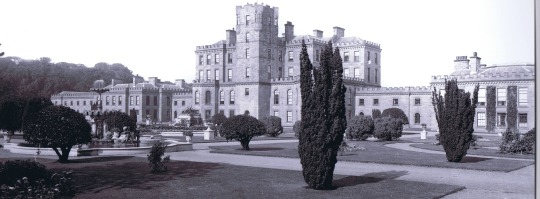
The Gordon Castle is located near Fochabers in Moray, Scotland. Historically known as the Bog-of-Gight or Bog o'Gight, it was the principal seat of the Dukes of Gordon. Following 18th-century redevelopment, it became one of the largest country houses ever built in Scotland.
Following the deaths of the 7th and 8th Dukes within a decade of one another the Gordon Estates of 180,000 acres (73,000 hectares) were put up for sale by the 9th Duke to pay the enormous death duties. The majority of the contents of the castle were sold and most of the castle was demolished, but the 16th-century tower of Bog-of-Gight and one of the wings—now a detached medium sized country house in its own right—survive.
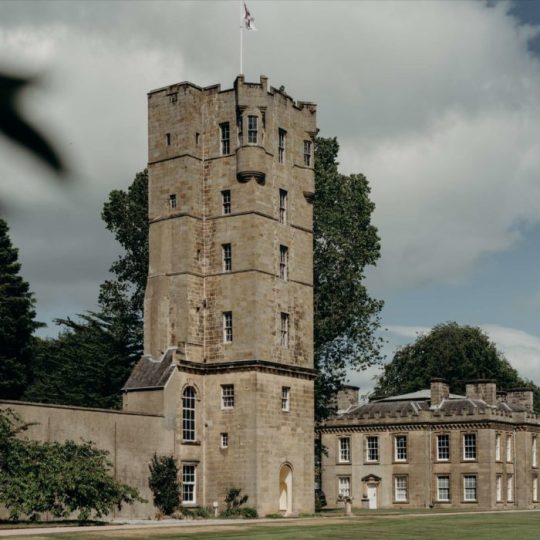
Still living in the remaining part of the castle is the Chief of Clan Gordon: Granville Charles Gomer Gordon, 13th Marquess of Huntly, Earl of Enzie, Earl of Aboyne, Lord Gordon of Badenoch, Lord Gordon of Strathavon and Glenlivet, Baron Meldrum of Morven. The Chief of Clan Gordon is known as: The Cock o' the North. Hear the clan song . . .
youtube
The main Robertson castle was at Invervack, near the present Clan museum, it was burned by Cromwell's forces during the Civil War. Dunalastair Castle was the original seat of the chiefs of Clan Robertson. The castle was eventually replaced by Dall House. Dall Estate is located on the south shore of Loch Rannoch in Perthshire.
In 1854, George Robertson, the 18th Chief, sold off the Struan estates and, for many years, his successors lived in Kingston, Jamaica, although a Clan Donnachaidh Society was formed in Edinburgh in 1893.
Alexander Gilbert Haldane Robertson of Struan celebrated his 38th year as Chief of Clan Donnachaidh in 2021. He bought a small fruit farm in the southeast of England in 1980 and has been growing apples and grading fruit for himself and neighboring farmers ever since.
He has one son and two daughters and three grandchildren. His son, Alasdair Gilbert Robertson of Drumachuine, younger of Struan, is his heir.
Struan and his family are members of, and actively support, the Clan Donnachaidh Society. The annual general meeting of the Society and the associated weekend of social activities organized by the Society in clan country each year provide a regular opportunity for clanspeople to meet with him and his family.
Struan has visited branches of the Clan Society in Canada and the United States. He was present at an international gathering of clans in Nova Scotia in 1987 and has attended highland games, including the Grandfather Mountain Games, in the USA. Struan has also visited branches of the Clan Society in Australia and participated in Scottish Australian Heritage weeks. He was present at the unveiling of a cairn at Robertson Point on the shores of Sydney Harbour during the bi-centennial celebrations of 1988.
Robertsons love the sword dance . . .
youtube
And a great lullaby . . .
youtube
0 notes
Photo
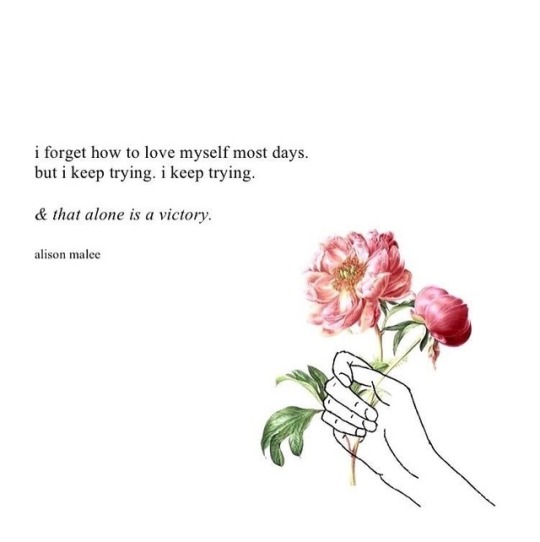
“Last Night I Almost Let Him Murder My Soul (The Accomplice Edition)” THE CRIME AND THE CONVICTION (Kingston enters the room): Tear drops. A tear dropped and all of a sudden I was falling apart. My murderer had just exited the room and I was now bawling. He is possibly my one and only love and so far the greatest love I have ever known. While in the same room with him...I held my own. You see...I never let him see me cry. But once he walks out...the tears drop and my secret is now exposed. Strong independent fierce me is scared of losing a man...just this one man. A man whose feelings for me are dead upon arrival. Hardly anyone knows my secret for I could always keep a man for a very long time. I am beautiful and successful yet one of the few things society notices about me is how long I can keep a man! They piss on my degrees and shit on my career but oh that Kingston would not be that memorable if she could not keep a man! As the years go on, the whispers get louder. She can keep them but boy she can’t get them to close the deal! No one really listens to me when I say that I never wanted to be married nor have children. No one pays attention to the fact that I have had many suitors that wanted to spend their lives with me. All society cares about is the fact that I am now an unmarried woman of a certain age with no children. Barren...they call me behind my back. BARREN! As in nothing grows there! No one knows for certain if this is true...least of all me yet the whispers haunt me to the point where I start to believe their lies. A woman ain’t shit without a man who claims her...they say. I stand there frozen with my degrees in one hand and my career in the other. Puzzled. Essentially made to feel barren. I sure can keep a man but I can’t get him to worship me. I cannot get him to stop seeing my strengths as weaknesses. Make your man feel like a man...they say. If I cannot do this then I am a failure. Then the next stage of torture begins. MOVE ON...they say. Find a man who can commit and give you children...they all chant. Never asking if my womb is even open to interpretation. My interpretation. They make my love fluid as if it can transfer to any penis ready to commit. Never mind that there is something about him that made me stay. Never thinking for a second that my mind, body, and soul are not for sale. I am not livestock for men. I belong to me!!!! I am still the master of my own destiny. I am still KINGSTON JAEL FIRST OF HER NAME, QUEEN OF HERSELF FROM THE ISLAND OF JAMAICA, AND OF THE HOUSE OF MICHAELS. I am a queen. In my heart, I have always known this. Why then would I allow society to question my every move and allow him to attempt to murder my soul? Why would a fiercely independent woman do this? I went to a party once and they were serving something called Kool-Aid. Many had grown up drinking it but it was never served in my home. Instantly, I did not like the look of it but everyone else was happily drinking it. Who wants to be left out? No one. So I sip...but am careful to not gulp it like others around me. The Kool-Aid has the taste of desperation, loneliness, and complacency. Yet I continue to sip. Making a face I think...maybe it is an acquired taste? Maybe I will get use to it? Finally I start to feel sick and I stop sipping. He is standing over me now and I can feel the tears in my throat. Kingston, be strong....I think. Demand your worth! And if he walks out and never comes back...your life will be full no matter what. There will be love...maybe not romantic love...but the strongest love of them all...SELF LOVE! You can walk with your head held high and not have to worry every moment of the day that his emotionally unavailable self will abandon you! You can decide to not be part of the flock that blindly follows the shepherd. You can dare to be different. You can ask for your worth AND more...just like a man would do...while maintaining your womanly strengths. You can be unapologetically brilliant in a room filled with people. You can stand alone. It would be misleading of me to not point out how terrifying this all is. Who will stay with me as I age? Who will remind me that I am great and perfectly made on the days I doubt myself? Who will leave the singles pity parties behind and join me on my island of one? Who will bravely step forward and remind me that it was his loss...not mine....if he does not return with a brand new attitude....one of gratitude, love, and respect? Who will laugh with me? Who will cry with me? Who will help me celebrate my strengths? He exits the room and I start to cry. Not one of those begging my lover to come back to me cries....but one of those cries of exhales. I am breathing. Exhaling. Crying. I am standing up. I am throwing the fucking Kool-Aid down the sink. I am exhaling again...this time effortlessly. And now I’m dialing the number of the one person in the world that understands my struggles the most. I am calling for reinforcement. I am calling Harmony. And I am now sipping a glass of moscato wine. I was never meant to drink the Kool-Aid. I am wine...getting better with age. THE EXPUNGEMENT (Harmony enters the room): WOMEN So there's a saying behind every great man is a strong woman but there is no saying about who stands behind that strong woman. I think it is her girlfriends. It is the people she surrounds herself with. It is the people who tells her she can when she thinks she can't. It is the people who tell her she's beautiful when all she sees is ugly when she looks in the mirror. It is all the people who still believe in her when she cannot or does not believe in herself. Strong fiercely independent women have a struggle. It is a secret many do not want to talk about. In this secret dungeon...they seek love, acceptance, companionship, and sometimes maybe even something more than that (that is if she is daring enough to ask for what she is truly worth and more).... but they're so busy giving away all of themselves that sometimes they forget about self care. If more women took the time to love, support, hold up one another, celebrate each other's accomplishments, and compliment a stranger (who is really her sister in this struggle) on ANYTHING about herself...we could exhale beautifully together. In this exhale lies encouraging words that maybe no one has told her today or in her entire life...that TOGETHER WE MAKE EACH OTHER BETTER! Maybe she...we...really need to hear that. It is so hard to be a successful woman especially when you are a party of one! No partner in sight. No partner to make society feel comfortable about her “successful” existence. If a woman does not have the validation of a partner...she becomes an unwanted invisible being or comic relief for other women who sold their souls to be men’s livestock and are now secretly regretting it! I know this for I live it everyday. People look at me like I have failed in some kind of way. My education...my degrees that hang on the wall somehow make me less than...because I don't have a husband...AND I don't have a child. But I don't want either one of those things. I want the man who will love me, support me, and appreciate the fact that I went to professional school and EARNED my degree. I, HARMONY FIRST OF HER NAME, QUEEN OF HER LIFE, OF THE HOUSE OF HER FAMILY, EARNED HER DEGREES AND CAREER WITHOUT HIS NAME! That is my family's legacy...not his. This is the only man that I can love...one who loves me for who I truly am. I will accept nothing less. The lucky man who gets me needs to be 700 kinds of shades of special because I am not willing to settle. I would rather be alone. There! I said it! The thing that single women are not suppose to utter. I let my secret out. The secret that I would rather never have known the intimacies of that kind of true relationship than to give up any part of myself to have a relationship that is less than what my soul desires. Hell...my soul demands it! The thought has crossed my mind that this man may not exist...for me. And then what?! I have finally accepted that one day I may join the masses and succumb to the misconceived notion that a woman is nothing without a husband. I will drink the Kool-Aid and join lost women everywhere...drowning in the notion that I cannot be great by my fucking self! I hope that day never comes...for any of us...my fellow strong independent women. But right now my story continues. Bravely. Wrapped in self love and self care. However, this journey is not without its challenges. Currently, I am into someone. I like him a lot...more than any other person I have liked in a long time and he is scared of being hurt! I don't know what to do about that. I have made myself vulnerable. I have put myself out there with respect to my feelings for him. And I think that scares him. I have told him I am complicated. He has told me he likes that about me. I have told him I am into him...and every time I feel like we are making progress... he pulls away. I don't want to scare him. Hell the feelings I have for him scare the shit out of me. But I am strong enough to stay any course without sacrificing myself like a lamb. I don't know how to reassure him that I don't intend to hurt him. Yet I am so frustrated that I have to be held accountable for his heart and mine! While I don't have a lot of experience in relationships, I know I am strong, fierce, and independent enough to weather any storm of love. I will not blow away at the first sign of a strong wind. Hell a tornado could come and if the love is that supportive...that honest...that raw...that true...and that passionate...I promise you I will be the last woman standing! Stand I will...without compromising the qualities I love about myself...for I do not know how to do it any other way. I am not the girl who will play dumb to make any man feel better. In fact, I am the girl who will throw my education, my vocabulary, and my degrees right in your face. If he is man enough...he will catch them and fucking celebrate my achievements for it is nothing less than what I would do for him. I will not be his cheerleader while he stands in my bleachers dismissively....weakened by my inner and outer beauty while a storm brews around us. He must be wise and caring enough to cheer me on too! Am I being unreasonable here? Society whispers YES but my gut tells me NO. My instincts tell me that I am worthy of all of these beautiful things. And what if I do not receive them? Well this may mean that I am single forever. I am OK with that but my parents are not. I'm struggling to find the balance between what I want and need. I don't want my parents to worry about my ability to survive without them, but I need them to appreciate that I am not going to settle. I do not want the lives they created for themselves. I want to do better! And I have always fucking hated Kool-Aid that others have already drank. I would rather be a cold can of Bud Light ...popped open for the first time, quenching the thirst of only one man...the only man that was deserving of me. ~KJM and Harmony on Charm School Monday. As long as I have friends like Harmony, I will be okay no matter what happens with the Ex Factor for he is not the main source of my happiness and I will no longer allow him to be the main source of my unhappiness. My love is real and it is raw. I am not one of those women who will settle just for a man that wants me. I choose who is deserving of me and I will put a foot so high up his ass if he ever starts slipping. Society takes a man’s love so seriously (for he is not suppose to fall in love all the time) yet makes a woman’s love so fluid...like that love can transfer to any man ready to commit with a good resume! This is simply not true for strong women. We love who we love and no matter what happens he cannot destroy us for our source of happiness, strength, power, and intelligence never came from him. Self love and sisterhood are what it is all about! To my sisters in the struggle, may we continue to support each other no matter the storms that come. Harmony you are beautiful and you are intelligent! No matter what happens with this new guy...I’m here for you! Together...we are unstoppable. One love 💜
#mondaymorning#monday thoughts#charm school#bone thugs n harmony#beautiful women#woman#selflove#self care#self esteem#strong girls#strong black woman#strong women#blackgirlswhoblog#independent
1 note
·
View note
Photo
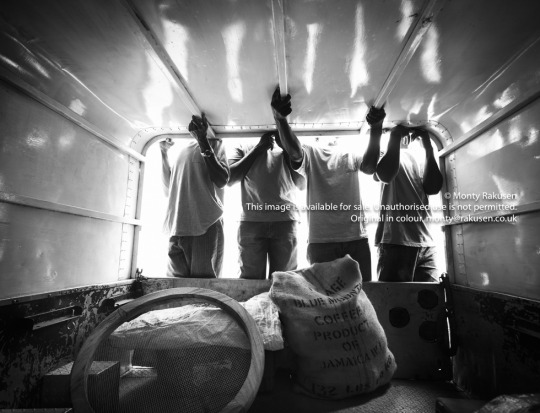
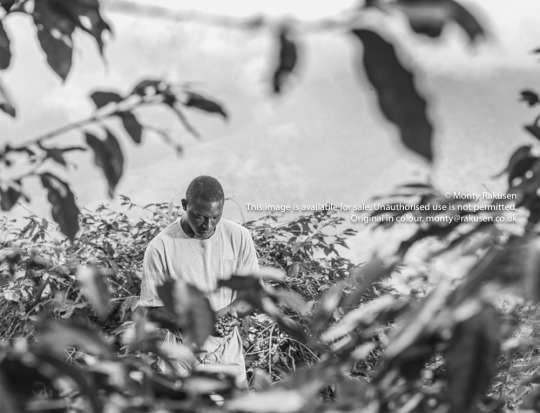
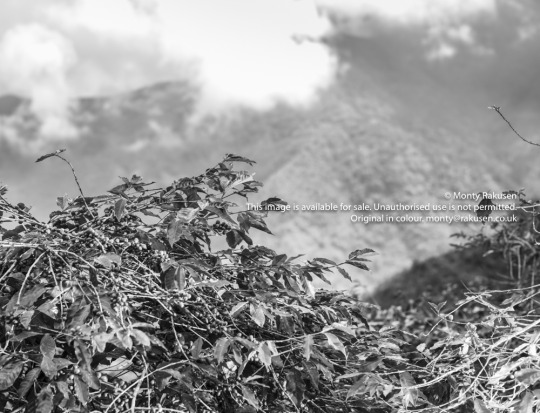
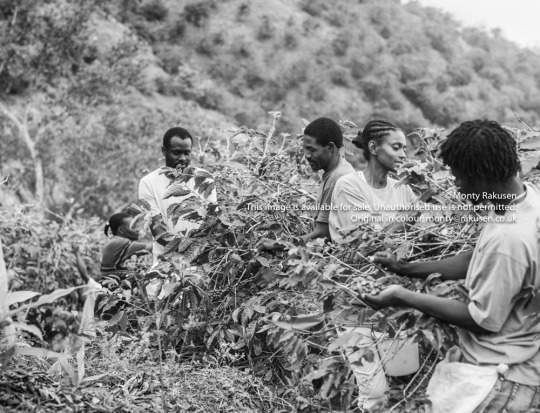
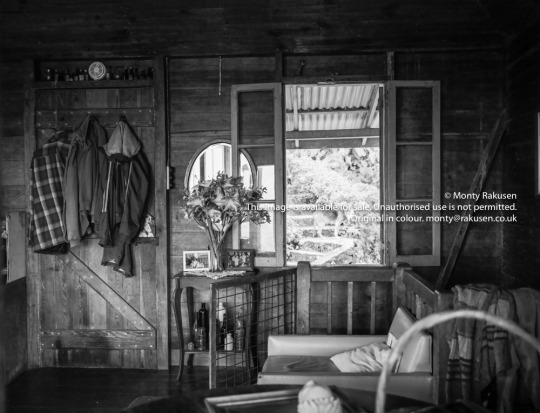
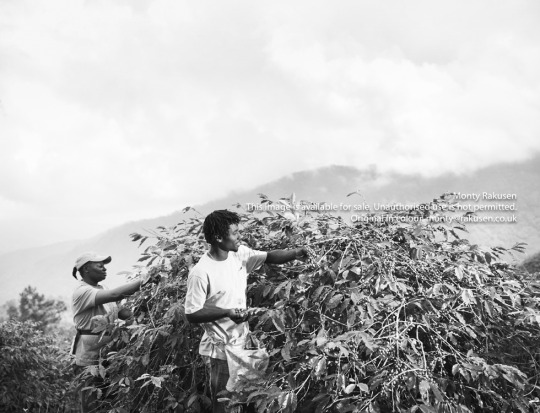
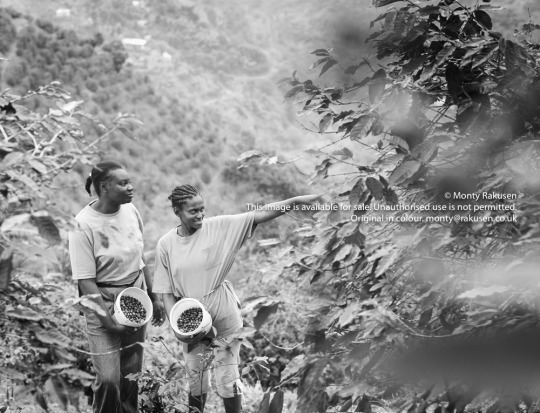
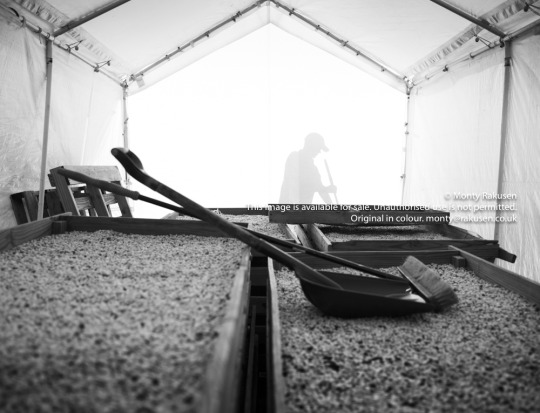
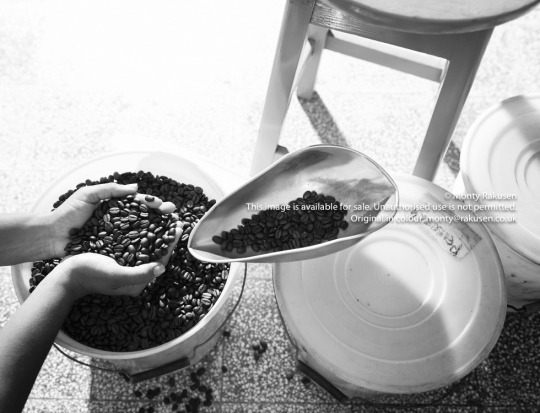
PART THREE:
We flew to beautiful Jamaica to photograph Coffee and Sugar Cane.
After the financial crash in 2008, I became disillusioned with commissioned corporate photography and with help from our advisors, my wife and I began shooting a photo library collection. We were fortunate to know a family of coffee farmers in Jamaica who ran the Twyman Estate high up in the Blue Mountains and they kindly offered to look after us if we came to do a shoot on their coffee farm. We also found a sugar cane farm and processing plant which I could shoot as well. Fuelled with bloody marys, my friend and top art director Ashley Jouhar jetted across the Atlantic from London and into another world. The coffee farm was at the end of what seemed like an endless dusty bumpy track with spectacular aerial views of Kingston. We climbed into the clouds and the thin cool air. The main house was built precariously into the mountainside out of ancient timber and you could drink the fabulous blue mountain coffee, whilst looking out onto the clouds, with the coffee bushes spread below. Most of our time was spent climbing up and down grassy tracks amongst the happy characterful people picking the incredible red berries. There were some Land Rover journeys in the mud to almost inaccessible places. The beans are picked, sorted, left to ferment the outer pulp off, cleaned and then driven down to Kingston where they are dried in the sun. They then get roasted and go back up the mountain for grinding and packing. Blue mountain estate coffee is really special. You can find out more here: http://www.jamaicatravelandculture.com/destinations/the_blue_mountains/old-tavern-coffee-estate.htm
This project was never an art project but a commercial venture and went on to do very well, still dominating the market. It was all originally in colour and the images are still available for sale, (all fully model released). It was shot on Hasselblad H4d camera kit. I find it wonderful how black and white simplifies and directs the messages in pictures. Assistance: The Twyman family Art direction: Ashley Jouhar Text editing: John Coombes
#jamaica
#bluemountain
#coffee
0 notes